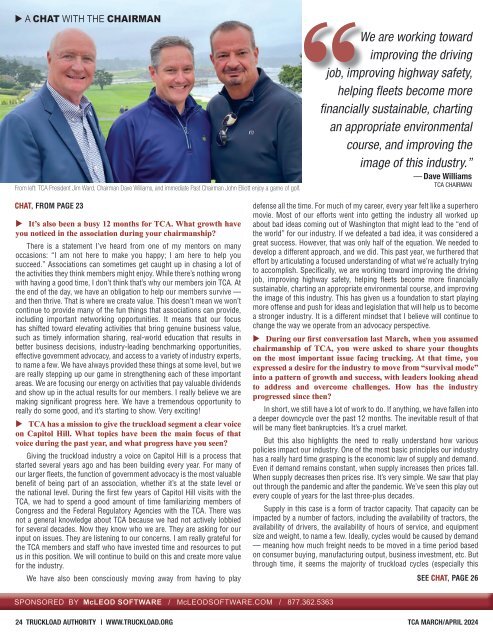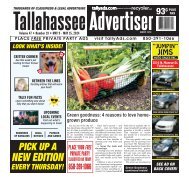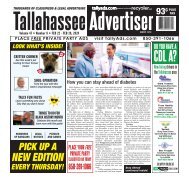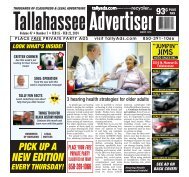TLA65_AllPages
You also want an ePaper? Increase the reach of your titles
YUMPU automatically turns print PDFs into web optimized ePapers that Google loves.
A CHAT WITH THE CHAIRMAN<br />
From left: TCA President Jim Ward, Chairman Dave Williams, and immediate Past Chairman John Elliott enjoy a game of golf.<br />
We are working toward<br />
improving the driving<br />
job, improving highway safety,<br />
helping fleets become more<br />
financially sustainable, charting<br />
an appropriate environmental<br />
course, and improving the<br />
image of this industry.”<br />
— Dave Williams<br />
TCA Chairman<br />
CHAT, FROM PAGE 23<br />
u It’s also been a busy 12 months for TCA. What growth have<br />
you noticed in the association during your chairmanship?<br />
There is a statement I’ve heard from one of my mentors on many<br />
occasions: “I am not here to make you happy; I am here to help you<br />
succeed.” Associations can sometimes get caught up in chasing a lot of<br />
the activities they think members might enjoy. While there’s nothing wrong<br />
with having a good time, I don’t think that’s why our members join TCA. At<br />
the end of the day, we have an obligation to help our members survive —<br />
and then thrive. That is where we create value. This doesn’t mean we won’t<br />
continue to provide many of the fun things that associations can provide,<br />
including important networking opportunities. It means that our focus<br />
has shifted toward elevating activities that bring genuine business value,<br />
such as timely information sharing, real-world education that results in<br />
better business decisions, industry-leading benchmarking opportunities,<br />
effective government advocacy, and access to a variety of industry experts,<br />
to name a few. We have always provided these things at some level, but we<br />
are really stepping up our game in strengthening each of these important<br />
areas. We are focusing our energy on activities that pay valuable dividends<br />
and show up in the actual results for our members. I really believe we are<br />
making significant progress here. We have a tremendous opportunity to<br />
really do some good, and it’s starting to show. Very exciting!<br />
u TCA has a mission to give the truckload segment a clear voice<br />
on Capitol Hill. What topics have been the main focus of that<br />
voice during the past year, and what progress have you seen?<br />
Giving the truckload industry a voice on Capitol Hill is a process that<br />
started several years ago and has been building every year. For many of<br />
our larger fleets, the function of government advocacy is the most valuable<br />
benefit of being part of an association, whether it’s at the state level or<br />
the national level. During the first few years of Capitol Hill visits with the<br />
TCA, we had to spend a good amount of time familiarizing members of<br />
Congress and the Federal Regulatory Agencies with the TCA. There was<br />
not a general knowledge about TCA because we had not actively lobbied<br />
for several decades. Now they know who we are. They are asking for our<br />
input on issues. They are listening to our concerns. I am really grateful for<br />
the TCA members and staff who have invested time and resources to put<br />
us in this position. We will continue to build on this and create more value<br />
for the industry.<br />
We have also been consciously moving away from having to play<br />
defense all the time. For much of my career, every year felt like a superhero<br />
movie. Most of our efforts went into getting the industry all worked up<br />
about bad ideas coming out of Washington that might lead to the “end of<br />
the world” for our industry. If we defeated a bad idea, it was considered a<br />
great success. However, that was only half of the equation. We needed to<br />
develop a different approach, and we did. This past year, we furthered that<br />
effort by articulating a focused understanding of what we’re actually trying<br />
to accomplish. Specifically, we are working toward improving the driving<br />
job, improving highway safety, helping fleets become more financially<br />
sustainable, charting an appropriate environmental course, and improving<br />
the image of this industry. This has given us a foundation to start playing<br />
more offense and push for ideas and legislation that will help us to become<br />
a stronger industry. It is a different mindset that I believe will continue to<br />
change the way we operate from an advocacy perspective.<br />
u During our first conversation last March, when you assumed<br />
chairmanship of TCA, you were asked to share your thoughts<br />
on the most important issue facing trucking. At that time, you<br />
expressed a desire for the industry to move from “survival mode”<br />
into a pattern of growth and success, with leaders looking ahead<br />
to address and overcome challenges. How has the industry<br />
progressed since then?<br />
In short, we still have a lot of work to do. If anything, we have fallen into<br />
a deeper downcycle over the past 12 months. The inevitable result of that<br />
will be many fleet bankruptcies. It’s a cruel market.<br />
But this also highlights the need to really understand how various<br />
policies impact our industry. One of the most basic principles our industry<br />
has a really hard time grasping is the economic law of supply and demand.<br />
Even if demand remains constant, when supply increases then prices fall.<br />
When supply decreases then prices rise. It’s very simple. We saw that play<br />
out through the pandemic and after the pandemic. We’ve seen this play out<br />
every couple of years for the last three-plus decades.<br />
Supply in this case is a form of tractor capacity. That capacity can be<br />
impacted by a number of factors, including the availability of tractors, the<br />
availability of drivers, the availability of hours of service, and equipment<br />
size and weight, to name a few. Ideally, cycles would be caused by demand<br />
— meaning how much freight needs to be moved in a time period based<br />
on consumer buying, manufacturing output, business investment, etc. But<br />
through time, it seems the majority of truckload cycles (especially this<br />
SEE CHAT, PAGE 26<br />
Sponsored by Mcleod software / McLeodSoftware.com / 877.362.5363<br />
24 Truckload Authority | www.Truckload.org TCA MARCH/APRIL 2024
















